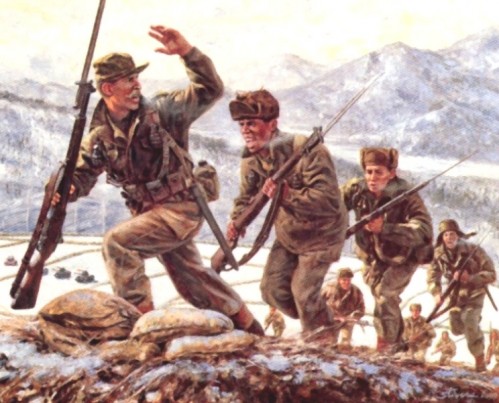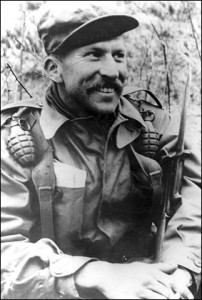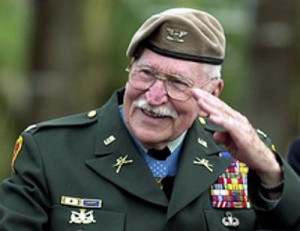Medal of Honor recipient Lewis Millett, hero of Battle of Bayonet Hill, passes
[Originally published at The US Report]

In 1940, Lewis L. “Red” Millett, a 17 year old native of Mechanic Falls, Maine, dropped out of high school and joined the Army Air Corps in order to fight the increasing fascist threat in Europe. But when President Roosevelt stated that the U.S. would not be entering the war, Millett decided to pack his bags and head to Canada – not to avoid combat, but to seek it out as part of the Canadian army. He was sent to London where he served as an anti-aircraft gunner during the Nazi’s “Blitz” bombing campaign.
“I deeply believe that if you’re a free man, then you should stand up and support freedom wherever it is,” Millett said during an interview on the 2003 PBS documentary American Valor.
 When the U.S. joined the war in 1942, Millet was able to transfer back to the American Army. Joining the 1st Armored Division, Millett earned the Silver Star – the nation’s third-highest award for valor – for his actions in North Africa. He also fought at Salerno and Anzio, but paperwork suggesting he had “deserted” in 1940 (by going to Canada) caught up to Millett. He was court-martialed, demoted to private, and fined $52.
When the U.S. joined the war in 1942, Millet was able to transfer back to the American Army. Joining the 1st Armored Division, Millett earned the Silver Star – the nation’s third-highest award for valor – for his actions in North Africa. He also fought at Salerno and Anzio, but paperwork suggesting he had “deserted” in 1940 (by going to Canada) caught up to Millett. He was court-martialed, demoted to private, and fined $52.
However following his punishment, Millett received a battlefield promotion to second lieutenant and a Bronze Star.
Then on Feb. 7, 1951 during the Korean War, Millett – who had been promoted to Captain – was leading an under-strength company of 27th Infantry Regiment “Wolfhounds” against a strongly held enemy position on Hill 180, which is now part of Osan Air Base in South Korea.
“The Chinese had put out the word that we were afraid of bayonets,” Millett told Stars and Stripes in a 1975 interview. “‘Americans afraid of bayonets’ is just ridiculous, I thought, so I intended to prove a point.”
During the attack, one of Millett’s platoons became pinned down by small-arms, automatic, and “buffalo gun” anti-tank fire. Millett ordered another platoon forward, telling his men to “Fix bayonets and follow me!”
Despite being wounded by a grenade blast, Millett charged forward – firing his rifle, throwing grenades, and striking enemies with his rifle and bayonet. When Millett reached a three-man buffalo gun emplacement, he killed all three with his bayonet. Once at the top of the hill, Millett waved his rifle over his head, encouraging his men by shouting “Grenades and cold steel!” – while still fighting the enemy.

Millett’s charge was so effective that the remaining Communist forces fled, but not before 47 North Korean and Chinese soldiers lay dead, 18 of which had been killed by bayonets.
Capt. Millett was awarded the Medal of Honor – the nation’s highest decoration for valor – for his actions on Hill 180, which came to be known as the Battle of Bayonet Hill.
“I was surprised, I never expected it,” Millett told Stars and Stripes. “Of course, a lot of real fine people had to die so that a few might get decorated. There’s an awful lot of men who lie buried over here, and the only recognition they received was the purple heart.”
Lewis L. Millett, 88, passed away Saturday morning in Loma Linda, Calif. His passing means that only 93 living recipients of America’s Medal of Honor remain.
In Sept. 2010, the Medal of Honor Society will hold its national convention in Charleston, S.C., giving Americans the opportunity to honor those like Lewis Millett who have given so much for this country.